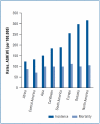Advancing Cancer Control Through Research and Cancer Registry Collaborations in the Caribbean
- PMID: 26678981
- PMCID: PMC4743663
- DOI: 10.1177/107327481502200420
Advancing Cancer Control Through Research and Cancer Registry Collaborations in the Caribbean
Abstract
Background: Few national registries exist in the Caribbean, resulting in limited cancer statistics being available for the region. Therefore, estimates are frequently based on the extrapolation of mortality data submitted to the World Health Organization. Thus, regional cancer surveillance and research need promoting, and their synergy must be strengthened. However, differences between countries outweigh similarities, hampering registration and availability of data.
Methods: The African-Caribbean Cancer Consortium (AC3) is a broad-based resource for education, training, and research on all aspects of cancer in populations of African descent. The AC3 focuses on capacity building in cancer registration in the Caribbean through special topics, training sessions, and biannual meetings. We review the results from selected AC3 workshops, including an inventory of established cancer registries in the Caribbean region, current cancer surveillance statistics, and a review of data quality. We then describe the potential for cancer research surveillance activities and the role of policymakers.
Results: Twelve of 30 Caribbean nations have cancer registries. Four of these nations provide high-quality incidence data, thus covering 14.4% of the population; therefore, regional estimates are challenging. Existing research and registry collaborations must pave the way and are facilitated by organizations like the AC3.
Conclusions: Improved coverage for cancer registrations could help advance health policy through targeted research. Capacity building, resource optimization, collaboration, and communication between cancer surveillance and research teams are key to obtaining robust and complete data in the Caribbean.
Figures



References
-
- World Health Organization website [Accessed November 11, 2015];Cancer. http://www.who.int/cancer/en.
-
- Ferlay J, Soerjomataram I, Ervik M, et al., editors. GLOBOCAN cancer incidence and mortality worldwide database. Vol 1. International Agency for Research on Cancer; Lyon, France: [Accessed October 12, 2015]. 2013. IARC CancerBase no. 11. http://globocan.iarc.fr/Default.aspx.
-
- Pan American Health Organization. World Health Organization. Health Information and Analysis Project (HSD/HA) Health Situation in the Americas: Basic Indicators 2012. WHO; Washington, DC: 2012.
-
- Ragin C, Campbell G. Building capacity to address cancer health disparities in populations of African descent: establishing international networks and successful collaborations. Presented at: African Caribbean Cancer Consortium; Miami, FL. November 11–12, 2010.
Publication types
MeSH terms
Grants and funding
LinkOut - more resources
Full Text Sources
Other Literature Sources

